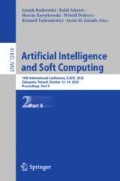Abstract
In the paper, the application of the machine learning methods in the food processing industry is presented to validate the quality of the production process and its parameters. These parameters e.g. raw products’ carbon footprint, energy resources and their carbon footprint usually may vary from day-to-day production because of meters’ instrumental errors or human random errors. One of the human factor is false accounting of the production in the system that sometimes happen. One of the instrumental errors can be the malfunction of the meters. In the authors’ project, the main goal is to optimize the production process so as to limit the carbon footprint. The problem that aroused is the trustworthiness of the data read from meters or provided by people operating the production line. That is why we applied the set of machine learning methods to validate the processes in order to choose the trustworthy ones. In the paper, we compare the results of processes classification k-Nearest Neighbors, Neural Network, C4.5, Random Forest and Support Vector Machines.
Access this chapter
Tax calculation will be finalised at checkout
Purchases are for personal use only
References
United Nations Framework Convention on Climate Change, 1 July 2019
Kyoto Protocol to the United Nations Framework Convention on Climate Change. UN Treaty Database, 27 June 2019
Paris Agreement. United Nations Treaty Collection, 27 June 2019
European Environment Agency, Increasing energy consumption is slowing EU progress in the use of renewable energy sources and improving energy efficiency (in polish), 22 March 2019
Godfray, H.C.J.: Food security: the challenge of feeding 9 billion people. Science 327, 812–818 (2010)
Meyfroidt, P.: Trade-offs between environment and livelihoods: bridging the global land use and food security discussions. Glob. Food Secur. 16, 9–16 (2018)
PAS 2050: The Guide to PAS2050-2011, Specification for the assessment of the life cycle greenhouse gas emissions of goods and services. British Standards Institution (2011)
ISO/TS 14067: Greenhouse gases - Carbon footprint of products - Requirements and guidelines for quantification. International Organization for Standardization, Geneva (2018)
ISO14040: Environmental management-life cycle assessment: principles and framework. International Organization for Standardization, Geneva (2006)
ISO14064-1: Greenhouse gases - Part 1: Specification with guidance at the organization level for quantification and reporting of greenhouse gas emissions and removals. International Organization for Standardization, Geneva (2018)
Shrink That Footprint. http://shrinkthatfootprint.com/electricity-emissions-around-the-world. Accessed 11 Aug 2019
Lauer, T., Legner, S.: Plan instability prediction by machine learning in master production planning. In: 15th International Conference on Automation Science and Engineering (CASE), Vancouver, Canada, pp. 703–708. IEEE (2019)
Clairand, J., Briceño-León, M., Escrivá-Escrivá, G., Pantaleo, A.M.: Review of energy efficiency technologies in the food industry: trends, barriers, and opportunities. IEEE Access 8, 48015–48029 (2020)
Pittino, F., Puggl, M., Moldaschl, T., Hirschl, C.: Automatic anomaly detection on in-production manufacturing machines using statistical learning methods. Sensors 20, 2344 (2020)
Was, L., Milczarski, P., Stawska, Z., Wiak, S., Maslanka, P., Kot, M.: Verification of results in the acquiring knowledge process based on IBL methodology. In: Rutkowski, L., Scherer, R., Korytkowski, M., Pedrycz, W., Tadeusiewicz, R., Zurada, J.M. (eds.) ICAISC 2018. LNCS (LNAI), vol. 10841, pp. 750–760. Springer, Cham (2018). https://doi.org/10.1007/978-3-319-91253-0_69
Ali, S.A., Tedone, L., De Mastro, G.: Optimization of the environmental performance of rainfed durum wheat by adjusting the management practices. J. Clean. Prod. 87, 105–118 (2015)
Bagchi, D., Biswas, S., et al.: Carbon footprint optimization: game theoretic problems and solutions. ACM SIGecom Exchanges 11(1), 34–38 (2012)
J IPCC Guidelines for National Greenhouse Gas Inventories (2006). http://www.ipcc-nggip.iges.or.jp/public/2006gl/index.html. Accessed 27 June 2019
Cuixia, Z., Conghu, L., Xi, Z.: Optimization control method for carbon footprint of machining process. Int. J. Adv. Manuf. Technol. 92, 1601–1607 (2017). https://doi.org/10.1007/s00170-017-0241-1
Kulak, M., Nemecek, T., Frossard, E., Gaillard, G.: Eco-efficiency improvement by using integrative design and life cycle assessment. The case study of alternative bread supply chains in France. J. Clean. Prod. 112, 2452–2461 (2016)
Renouf, M.A., Renaud-Gentie, C., Perrin, A., Kanyarushoki, C., Jourjon, F.: Effectiveness criteria for customised agricultural life cycle assessment tools. J. Clean. Prod. 179, 246–254 (2018)
Perez-Neira, D., Grollmus-Venegas, A.: Life-cycle energy assessment and carbon footprint of peri-urban horticulture. A comparative case study of local food systems in Spain. Landscape Urban Plann. 172, 60–68 (2018)
Harrington, P.: Machine Learning in Action. Manning Publications, New York (2012)
Acknowledgments
The paper is written as a part of the project CFOOD that is supported by The National Centre for Research and Development, Poland, grant number BIOSTRATEG3/343817/17/NCBR/2018.
Author information
Authors and Affiliations
Corresponding author
Editor information
Editors and Affiliations
Rights and permissions
Copyright information
© 2020 Springer Nature Switzerland AG
About this paper
Cite this paper
Milczarski, P., Zieliński, B., Stawska, Z., Hłobaż, A., Maślanka, P., Kosiński, P. (2020). Machine Learning Application in Energy Consumption Calculation and Assessment in Food Processing Industry. In: Rutkowski, L., Scherer, R., Korytkowski, M., Pedrycz, W., Tadeusiewicz, R., Zurada, J.M. (eds) Artificial Intelligence and Soft Computing. ICAISC 2020. Lecture Notes in Computer Science(), vol 12416. Springer, Cham. https://doi.org/10.1007/978-3-030-61534-5_33
Download citation
DOI: https://doi.org/10.1007/978-3-030-61534-5_33
Published:
Publisher Name: Springer, Cham
Print ISBN: 978-3-030-61533-8
Online ISBN: 978-3-030-61534-5
eBook Packages: Computer ScienceComputer Science (R0)

